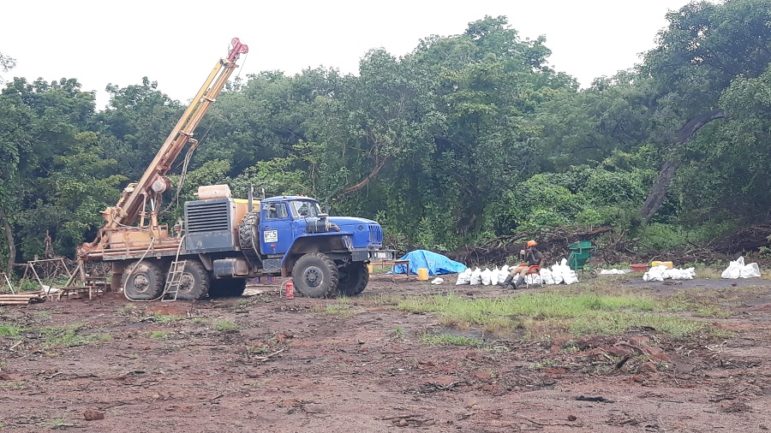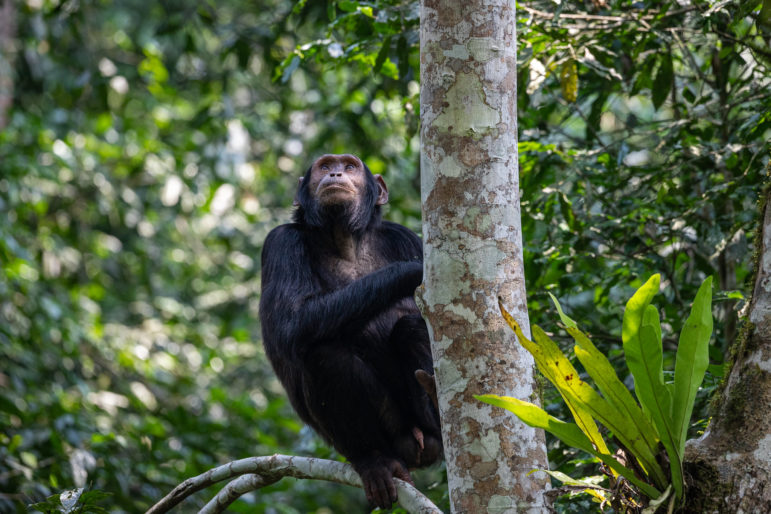In July 2021, Mongabay published an investigation into an Australian mining firm’s plan to drill within the boundaries of Haut Niger National Park and home to endangered chimpanzees. Predictive Discovery’s plans were in response to its findings of more than $6 billion in “bonanza”-grade gold deposits at its Bankan exploration site in eastern Guinea.
In the weeks following the company’s announcement about its findings, its share price nearly doubled as investors rushed to get in on what looked like one of the biggest gold discoveries in recent West African history.
However, what Predictive Discovery left out was that the location of the drilling site, along with its work there, was illegal.
Mongabay’s investigation found that the company’s exploration was taking place inside the boundaries of Haut Niger National Park, in violation of the law establishing the protected area. The park is home to an estimated 500 western chimpanzees, one of the highest concentrations of the critically endangered primate in West Africa. The 647,000-hectare (1.6 million acres) park is also home to hippos, duikers, and lions.

Mining equipment at Predictive Discovery’s Bankan Project site, October 2021. Image by Abdoulaye Sylla for Mongabay.
The environmental consequences of industrial gold mining can be severe, as chemicals like cyanide are often used to separate gold deposits from the minerals and rocks they’re found in. Predictive Discovery’s Bankan Project is located just a few kilometers south of the Niger River, raising fears that pollution could be carried downriver if runoff or spills occur.
The establishment of an industrial gold mine inside park boundaries would likely attract workers and migrants from other parts of Guinea, as new roads and infrastructure are developed around what would be one of the biggest gold mines in West Africa. An influx of new arrivals and mining activity would put pressure on the park’s integrity and increase the prospect of incursions into the core zones, potentially threatening biodiversity there.
Real-world impact
Shortly after Mongabay requested comment from Predictive Discovery, the company issued a press release acknowledging that its Bankan Project fell inside the boundaries of the park, saying it was looking for “possible solutions” that would allow it to begin large-scale extraction at the site.
Following the press release, which disclosed it was the subject of “a pending media report questioning the legality” of the mining operation, Predictive Discovery’s share price fell sharply (34%) and it lost $150 million in market capitalization (more than a third of the company’s value).
Furthermore, the BBC learned of Mongabay’s report and interviewed Predictive Discovery’s Managing Director, Paul Roberts, about the situation on BBC Newsday, their global daily live news program.
Mongabay’s persistence in uncovering the truth about Predictive Discovery’s illegal mining operation resulted in greater public transparency, corporate accountability and provided investors with the information necessary to make informed decisions.
Support independent environmental journalism
If you are interested in helping shed light on conservation stories such as this one, there are two excellent ways you can do so with Mongabay. First, consider making a donation, which directly helps us continue to produce high impact journalism from nature’s frontline. Second, subscribe to Mongabay’s newsletter to get the latest environmental news delivered right to your inbox.
About Mongabay
Mongabay is a nonprofit environmental science and conservation news platform focused on providing cutting-edge independent journalism from nature’s frontline. We pride ourselves in producing reporting that has substantial, tangible impacts around the world.
